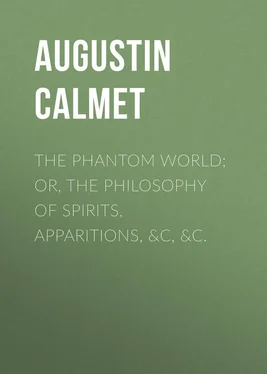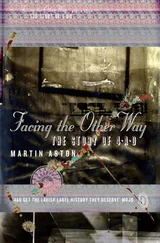Augustin Calmet - The Phantom World; or, The philosophy of spirits, apparitions, &c, &c.
Здесь есть возможность читать онлайн «Augustin Calmet - The Phantom World; or, The philosophy of spirits, apparitions, &c, &c.» — ознакомительный отрывок электронной книги совершенно бесплатно, а после прочтения отрывка купить полную версию. В некоторых случаях можно слушать аудио, скачать через торрент в формате fb2 и присутствует краткое содержание. Жанр: foreign_antique, foreign_prose, на английском языке. Описание произведения, (предисловие) а так же отзывы посетителей доступны на портале библиотеки ЛибКат.
- Название:The Phantom World; or, The philosophy of spirits, apparitions, &c, &c.
- Автор:
- Жанр:
- Год:неизвестен
- ISBN:нет данных
- Рейтинг книги:3 / 5. Голосов: 1
-
Избранное:Добавить в избранное
- Отзывы:
-
Ваша оценка:
- 60
- 1
- 2
- 3
- 4
- 5
The Phantom World; or, The philosophy of spirits, apparitions, &c, &c.: краткое содержание, описание и аннотация
Предлагаем к чтению аннотацию, описание, краткое содержание или предисловие (зависит от того, что написал сам автор книги «The Phantom World; or, The philosophy of spirits, apparitions, &c, &c.»). Если вы не нашли необходимую информацию о книге — напишите в комментариях, мы постараемся отыскать её.
The Phantom World; or, The philosophy of spirits, apparitions, &c, &c. — читать онлайн ознакомительный отрывок
Ниже представлен текст книги, разбитый по страницам. Система сохранения места последней прочитанной страницы, позволяет с удобством читать онлайн бесплатно книгу «The Phantom World; or, The philosophy of spirits, apparitions, &c, &c.», без необходимости каждый раз заново искать на чём Вы остановились. Поставьте закладку, и сможете в любой момент перейти на страницу, на которой закончили чтение.
Интервал:
Закладка:
One would imagine that the attraction of a better fortune, and a wish to enrich themselves, drew thither men and women. The devil never fails to make them magnificent promises, at least the sorcerers say so, and believe it, deceived, without doubt, by their imagination; but experience shows us that these people are always ragged, despised, and wretched, and usually end their lives in a violent and dishonorable manner.
When they are admitted for the first time to the sabbath, the demon inscribes their name and surname on his register, which he makes them sign; then he makes them forswear cream and baptism, makes them renounce Jesus Christ and his church; and, to give them a distinctive character and make them known for his own, he imprints on their bodies a certain mark with the nail of the little finger of one of his hands; this mark, or character, thus impressed, renders the part insensible to pain. They even pretend that he impresses this character in three different parts of the body, and at three different times. The demon does not impress these characters, say they, before the person has attained the age of twenty-five.
But none of these things deserve the least attention. There may happen to be in the body of a man, or a woman, some benumbed part, either from illness, or the effect of remedies, or drugs, or even naturally; but that is no proof that the devil has anything to do with it. There are even persons accused of magic and sorcery, on whom no part thus characterized has been found, nor yet insensible to the touch, however exact the search. Others have declared that the devil has never made any such marks upon them. Consult on this matter the second letter of M. de St. André, Physician to the King, in which he well develops what has been said about these characters of sorcerers.
The word sabbath, taken in the above sense, is not to be found in ancient writers; neither the Hebrews nor the Egyptians, the Greeks nor the Latins have known it.
The thing itself, I mean the sabbath taken in the sense of a nocturnal assembly of persons devoted to the devil, is not remarked in antiquity, although magicians, sorcerers, and witches are spoken of often enough – that is to say, people who boasted that they exercised a kind of power over the devil, and by his means, over animals, the air, the stars, and the lives and fortunes of men.
Horace 211 211 Horat. Epodon. xviii. 4.
makes use of the word coticia to indicate the nocturnal meetings of the magicians — Tu riseris coticia ; which he derives from Cotys , or Cotto , Goddess of Vice, who presided in the assemblies which were held at night, and where the Bacchantes gave themselves up to all sorts of dissolute pleasures; but this is very different from the witches' sabbath.
Others derive this term from Sabbatius , which is an epithet given to the god Bacchus, whose nocturnal festivals were celebrated in debauchery. Arnobius and Julius Firmicus Maternus inform us that in these festivals they slipped a golden serpent into the bosoms of the initiated, and drew it downwards; but this etymology is too far-fetched: the people who gave the name of sabbath to the assemblies of the sorcerers wished apparently to compare them in derision to those of the Jews, and to what they practiced in their synagogues on sabbath days.
The most ancient monument in which I have been able to remark any express mention of the nocturnal assemblies of the sorcerers is in the Capitularies, 212 212 "Quædam sceleratæ mulieres dæmonum illusionibus et phantasmatibus seductæ, credunt se et profitentur nocturnis horis cum Dianâ Paganorum deâ et innumerâ multitudine mulierum equitare super quasdam bestias et multa terrarum spalia intempestæ noctis silentio pertransire ejusque jussionibus veluti dominæ obedire." – Baluz. Capitular. fragment. c. 13. Vide et Capitul. Herardi, Episc. Turon.
wherein it is said that women led away by the illusions of the demons, say that they go in the night with the goddess Diana and an infinite number of other women, borne through the air on different animals, that they go in a few hours a great distance, and obey Diana as their queen. It was, therefore, to the goddess Diana, or the Moon, and not to Lucifer, that they paid homage. The Germans call witches' dances what we call the sabbath. They say that these people assemble on Mount Bructere.
The famous Agobard, 213 213 Agobard de Grandine.
Archbishop of Lyons, who lived under the Emperor Louis the Debonair, wrote a treatise against certain superstitious persons in his time, who believed that storms, hail, and thunder were caused by certain sorcerers whom they called tempesters ( tempestarios , or storm-brewers), who raised the rain in the air, caused storms and thunder, and brought sterility upon the earth. They called these extraordinary rains aura lavatitia , as if to indicate that they were raised by magic power. In this place the people still call these violent rains alvace . There were even persons sufficiently prejudiced to boast that they knew of tempêtiers , who had to conduct the tempests where they choose, and to turn them aside when they pleased. Agobard interrogated some of them, but they were obliged to own that they had not been present at the things they related.
Agobard maintains that this is the work of God alone; that in truth, the saints, with the help of God, have often performed similar prodigies; but that neither the devil nor sorcerers can do anything like it. He remarks that there were among his people superstitious persons who would pay very punctually what they called canonicum , which was a sort of tribute which they offered to these tempest-brewers ( tempêtiers ), that they might not hurt them, while they refused the tithe to the priest and alms to the widow, orphan, and other indigent persons.
He adds that he had of late found people sufficiently foolish enough to spread a report that Grimaldus, Duke of Benevento, had sent persons into France, carrying certain powders which they had scattered over the fields, mountains, meadows, and springs, and had thus caused the death of an immense number of animals. Several of these persons were taken up, and they owned that they carried such powders about with them and though they made them suffer various tortures, they could not force them to retract what they had said.
Others affirmed that there was a certain country named Mangonia, where there were vessels which were borne through the air and took away the productions; that certain wizards had cut down trees to carry them to their country. He says, moreover, that one day three men and a woman were presented to him, who, they said, had fallen from these ships which floated in the air. They were kept some days in confinement, and at last having been confronted with their accusers, the latter were obliged, after contesting the matter, and making several depositions, to avow that they knew nothing certain concerning their being carried away, or of their pretended fall from the ship in the sky.
Charlemagne 214 214 Vide Baluzii in Agobard. pp. 68, 69.
in his Capitularies, and the authors of his time, speak also of these wizard tempest-brewers, enchanters, &c., and commanded that they should be reprimanded and severely chastised.
Pope Gregory IX. 215 215 Fleury, Hist. Eccles. tom. xvii. p. 53, ann. 1234.
in a letter addressed to the Archbishop of Mayence, the Bishop of Hildesheim, and Doctor Conrad, in 1234, thus relates the abominations of which they accused the heretic Stadingians . "When they receive," says he, "a novice, and when he enters their assemblies for the first time, he sees an enormous toad, as big as a goose, or bigger. Some kiss it on the mouth, some kiss it behind. Then the novice meets a pale man with very black eyes, and so thin that he is only skin and bones. He kisses him, and feels that he is cold as ice. After this kiss, the novice easily forgets the Catholic faith; afterwards they hold a feast together, after which a black cat comes down behind a statue, which usually stands in the room where they assemble.
Интервал:
Закладка:
Похожие книги на «The Phantom World; or, The philosophy of spirits, apparitions, &c, &c.»
Представляем Вашему вниманию похожие книги на «The Phantom World; or, The philosophy of spirits, apparitions, &c, &c.» списком для выбора. Мы отобрали схожую по названию и смыслу литературу в надежде предоставить читателям больше вариантов отыскать новые, интересные, ещё непрочитанные произведения.
Обсуждение, отзывы о книге «The Phantom World; or, The philosophy of spirits, apparitions, &c, &c.» и просто собственные мнения читателей. Оставьте ваши комментарии, напишите, что Вы думаете о произведении, его смысле или главных героях. Укажите что конкретно понравилось, а что нет, и почему Вы так считаете.












